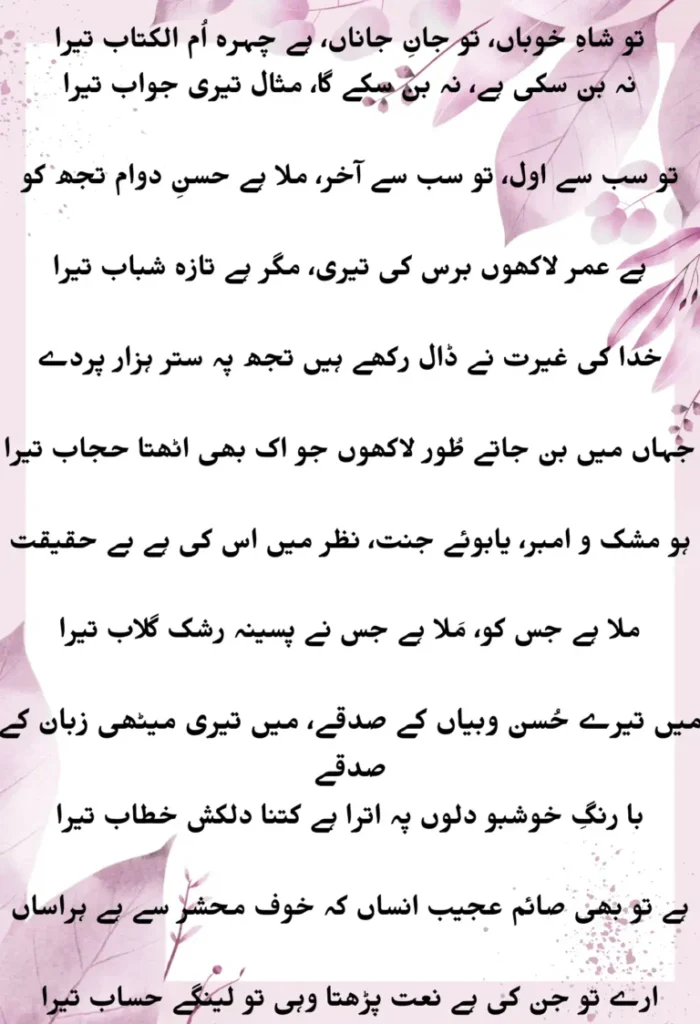The lyrics of Tu Shahe Khuban resonate with a profound sense of reverence and adoration. They paint a vivid picture of a beloved figure, likely a spiritual leader or a divine entity, inspiring deep devotion in the listener. Let’s delve into the tapestry of themes and emotions woven within these verses.

A Song of Adoration:
The lyrics overflow with love and respect for the subject, addressed as “Tu Shah E Khuban” (The King of Beauty) and “Jaan E Jaana” (Beloved). These titles highlight their exalted status and the immense affection held for them.
Divine Beauty and Allure:
The imagery employed evokes a powerful sense of divine beauty and presence. The subject’s countenance is described as the embodiment of beauty itself, the “Chehra Ummul Khitab Tera” (Face that is the essence of the scriptures). Their presence is likened to the captivating fragrance of musk and amber, symbolizing heavenly allure and attraction.
Eternal Youth and Radiance:
Time seems to hold no sway over this revered figure. Despite countless ages passing (“Hai Umar Lakho Baras Ki Teri” – Your lifespan is lakhs of years), they remain eternally youthful and vibrant (“Hai Taza Shabab Tera” – Your youth is fresh). This suggests a timeless and enduring quality to their being.
Veiled Mystery and Exclusivity:
The lyrics hint at the subject’s exclusivity and veiled mystery. Even the heavens are adorned with curtains out of respect (“Khuda Ki Ghairat Ne Dal Rakhe Hain Tujh Pe Sattar Hazar Parday” – God’s honor has placed seventy thousand veils upon you). This imagery hints at a profound reverence and the awe-inspiring nature of their existence.
Devotion and Sacrifice:
The narrator expresses unwavering devotion and admiration, willing to offer themself entirely in service and praise (“Mai Tere Husn O Bayaan Ke Sadqe” – I am a sacrifice for your beauty and description). This deep affection highlights the transformative power of their presence.
Submission and Accountability:
There’s also a sense of submission and acceptance of divine will. The lyrics acknowledge that those who recite the subject’s praise and offer tribute (“Arre Tu Jinki Hai Naat Padhta, Wohi to Lenge Hisaab Tera” – The one who recites your Naat, they will settle your account) will be accountable in the afterlife. This reinforces the significance of honoring the subject and the lasting impact of their being.
Tu Shahe Khuban transcends the realm of mere music, evolving into a heartfelt expression of love, devotion, and submission. It evokes a powerful sense of awe and admiration for the subject’s beauty, presence, and divine attributes, while reminding us of the enduring mystery and reverence that surrounds them.
Related post:
| Sara pyar zamane da naat lyrics pdf |
| Naat Muhammad Ka Roza Lyrics |
| Naat har waqt tasawwur mein naat |
| Naat Huzoor aisa koi intezam ho jaye lyrics |
FAQs:
The exact identity of the subject in “Tu Shahe Khuban” remains open to interpretation. However, the lyrics’ reverence and titles like “Tu Shah E Khuban” (The King of Beauty) suggest a figure of immense spiritual significance. This could be a revered prophet, a divine entity, or a powerful spiritual leade
The lyrics evoke a powerful cocktail of emotions. A deep sense of adoration and awe permeates the song, along with a yearning for connection with the divine. The imagery paints a picture of beauty and mystery, leaving listeners humbled and inspired.
Tu Shahe Khuban” resonates with listeners due to its universality of themes. The expressions of love, devotion, and submission to a higher power transcend cultural barriers. The song offers a space for spiritual contemplation and connection, making it a cherished piece for many.




